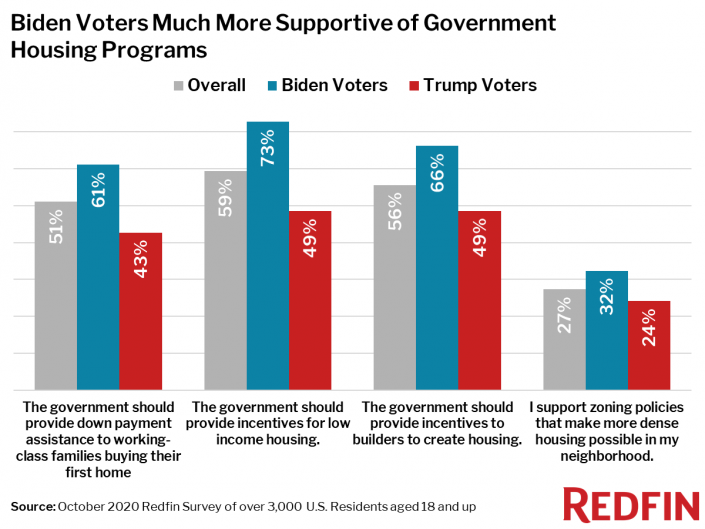Political polarization is at a fever pitch, but Trump and Biden supporters seem to have found common ground on one issue: NIMBYism.
Nearly 75 percent of U.S. residents oppose policies to increase housing density in their own neighborhoods, though more than half think the government should provide developers with incentives to build more housing. Opposition to more tightly-packed communities is bipartisan and holds true for homeowners as well as renters.
That’s according to a survey released last week by Redfin.
Although Joe Biden supporters were more likely to favor other pro-housing policies, they were joined by Donald Trump supporters in their rejection of denser housing in their own neighborhoods, the survey found.
Only 32 percent of Biden supporters and 24 percent of Trump supporters approve of policies that would increase density in their communities.
“Housing is one of the few types of policies that does not fall neatly into liberal or conservative camps,” said Redfin chief economist Daryl Fairweather. “While many Americans across both major parties can agree that there’s a need for more housing — particularly affordable housing — both Democrats and Republicans are reluctant to see their own neighborhoods become more dense.
Trump and Biden backers are split on other housing issues, however. Higher shares of Biden supporters than Trump supporters approve of increasing down payment assistance for working-class families and policy incentives for the development of low-income and market-rate housing.

The issue of newer and denser housing being built nearby may be more pressing for Americans in Democrat-leaning counties. Over the last four years, 56 percent of building permits issued in blue counties were for multifamily projects, according to data from the U.S. Census Bureau’s Building Permits Survey. In red and purple counties, only 16 percent and 31 percent, respectively, of all new building permits were for multifamily projects.
Renters and homeowners, while split on other issues, also oppose denser housing in “their own backyards.” About 62 percent of renters support down payment assistance compared to just 48 percent of homeowners. Yet renters are only slightly more likely to support low-income housing or higher density housing in their own neighborhoods than homeowners. Only 31 percent of renters support denser zoning in their neighborhood, compared with 26 percent of homeowners.
President Trump has touted himself as the person who will protect the suburbs against encroaching low-income housing, though critics call his vow little more than a racist dog whistle. In July, he announced that the Department of Housing and Urban Development would repeal an Obama-era rule requiring localities that receive federal funding to eliminate barriers to fair housing. Trump’s support in 2016 was typically higher in smaller counties with high homeownership rates, according to a Real Deal analysis of election results and American Community Survey data.
As of January, the U.S. faced a housing shortage of nearly four million homes. Although housing starts and construction spending is up over last year, most of that is for private single-family residences.
